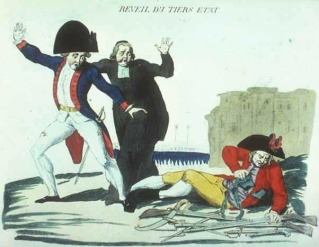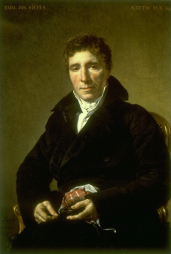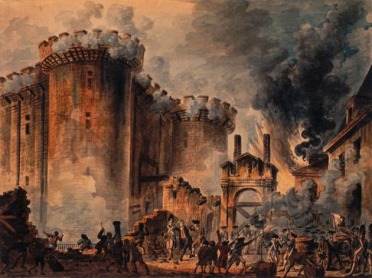The FRENCH REVOLUTION
before the REVOLT!

The highly praise culture and society of France in the 1700s won the respect of many and were imitated by surrounding countries. But this was only true for the surface of their identity – chaos broke in as the lower classmen and women finally took a stand against all the misfortune they’ve been placed under, thus resulting in the French Revolution. This event (or series of events) has the most impact on absolute power in France.
The French were divided distinctly into different social groups or classes, the First, Second and Third Estates. The first two were privileged, consisted of clergy and rich nobles, and roughly only 2 percent of the whole population. Still, the members of the first and second estate of France held most of the land to themselves and lead luxurious lives while the
A political cartoon depicting the Estates of France.
Bibliography: http://www.uncp.edu/home/rwb/third_estate.jpg
Third Estate lived, though in the same nation, in completely different life style and lack of even their daily requirements to survive.
The Third Estate was most of what France was really made of interiorly. Though even they were categorized into three different groups within itself, they all had a commonality – they were poorer and lived less of a luxurious life than those of the First and Second Estate. Members of the Third Estate included tradespeople, apprentices, and workers, but the very bottom of the whole social class was made of peasants. Many times they were found unemployed and hungry. It is no wonder that most of France was so prepared for a change to take place in their nation.
...TENSIONSTENSIONSTENSIONS....

All three estates came together to form the Estates-General – a council including the discussion of representatives from all three social classes. The Third Estate, so eager for change and driven by the Enlightenment ideas as a motivation, named themselves the National Assembly. Emmanuel-Joseph Sieyes took a large roll in this movement. Even though the Third Estate felt as though they were finally taking some part in the government, they found themselves locked out of the council. This started the French Revolution. Furious by the way that the upper social classmen had been treating them, the representatives broke in. They swore that they would change the country through a revolution right on the tennis court they entered onto. Thus, it became known as the Tennis Court Oath. Tensions grew, and Louis grew insecure.
Emmanuel-Joseph Sieyes.
Bibliography: http://upload.wikimedia.org/wikipedia/commons
/b/b1/David_-_Emmanuel_Joseph_Sieyès.png
MORE CHANGE!
Suspicions of the kings grew to intense levels; troops increased in numbers and rumors began to spread of how Louis was going to dismiss the National Assembly. The Third Estate decided to act upon this first before Louis did – a large crowd of angry peasants joined in forces and marched straight into Bastille on July 14. Killing the guards and marching through the streets with the guards’ heads on pikes, they sent a message to the monarchy that change was coming.
Chaos broke out into the country, and eventually reached the countryside as well. On October of 1789, a large group of Parisian women took the stand to act against the rising of prices on bread: without it, they would starve to death. Their riot led them all the way to Versailles where they broke in and killed some guards. Their demand was that the National Assembly to do something to help them with the rising prices of bread, and they also demanded that the king and queen, who were there at the time, to return to Paris, and they did.
In this, many of the noblemen surrendered to the lower classmen’s idea of equality and liberty, and confessed out of fear that they believed it too. As peasants constantly attacked upper classmen and their estates, the upper Estates grew afraid and finally gave into the Declaration of the Rights of Man and of the Citizen in 1789. The American Declaration of Independence heavily influenced this. Momentum was finally taking a foothold in French government, and further continued from here. For example, in 1791, the long awaited Constitution was completed, and signed by Louis (though he did not want to do so), completely changing government policy and creating a new branch – the Legislative Assembly – to crew, approve and reject new laws and declarations of war.
Bastille in chaos.
Bibliography: http://endtimepilgrim.org/bastille.jpg
A NEW REPUBLIC
War also broke out because of such changes being made. Influenced by Louis, Austria and Prussia urged France to allow Louis to continue his reign of power. Angering the Legislative Assembly, they responded by declaring war in 1792. One occasion that completely changed government in France occurred during this war. Rumors spread throughout the city that those who supported the king and were held in prison were planning to escape and take over the city. In response to this, the French people swarmed into prisons and killed over 1,000 prisoners, whether innocent or not. To respond under the immense pressure taken by the September Massacres, the Legislative Assembly put aside the Constitution of 1791, dethroning the king and setting up the country as a republic. Now, men were free to vote for their leaders.

